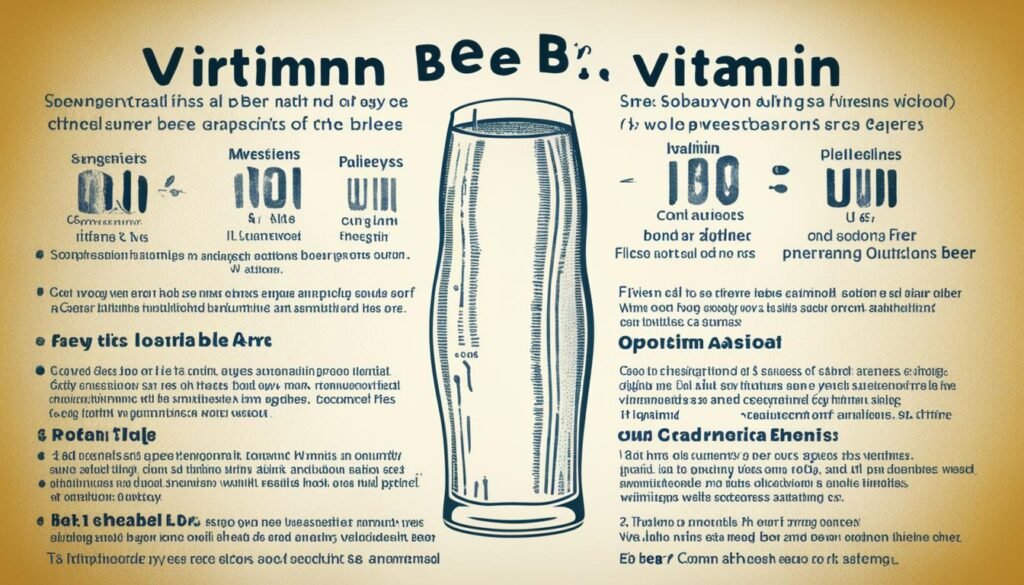Amid the longstanding debate regarding the impact of beer on health, emerging evidence has increasingly painted a nuanced picture, illuminating the often overlooked health benefits of beer. Considered by many as a leisurely beverage, beer’s potential to harmonize with a healthy lifestyle might come as a surprise. Unveiling the beer nutrition facts, it’s clear that the golden brew is more than just a refreshing drink – it’s a complex blend of vitamins and elements, contributing to the varied tapestry of our dietary intake.
Is beer good for you?
When savored in reasonable amounts, not only does beer foster social enjoyment, but it also carries a collection of intrinsic benefits. Spanning from longevity to cardiovascular wellness,
moderate beer consumption
could be the golden drop in an otherwise balanced lifestyle. As the dull echo of your favorite pub lingers in the background, let’s tap into the science and dispel the froth around beer’s controversial reputation.
Key Takeaways
- Moderate beer consumption could extend longevity and improve quality of life.
- Beer is a natural concoction, free from fat and brimming with B vitamins and minerals like magnesium.
- Regular, but limited intake of beer may promote heart health and elevate HDL cholesterol levels.
- The brewing process ensures that beer is often safer to drink than local water in areas with questionable water quality.
- Flavonoids present in hops offer antioxidant properties that could have anti-cancer effects.
- Moderation in beer consumption is key to enjoying its potential health benefits without the associated risks of overindulgence.
The Nutritional Profile of Beer
Contrary to common misconceptions, beer nutrition facts present a surprising complexity. Not only does beer contain a blend of macronutrients, but it is also a source of vital microelements that contribute to its nutritional profile. Let’s delve into what makes beer more than just a casual drink, exploring its constituents.
- Protein and Carbohydrates – Whilst relatively low in content, they are intrinsic to beer.
- Free of Fat – Beer does not contain fat, aligning with dietary preferences for fat-free options.
- B Vitamins – Niacin, riboflavin, choline, and notably, folate, are all components of beer.
- Minerals – A source of magnesium and selenium, beer can contribute to the daily mineral intake.
While beer may offer these nutrients, it should not replace nutrient-rich whole foods in a balanced diet. The casual pint, although beneficial in moderate amounts, cannot meet the entirety of an individual’s dietary requirements.
When considering calorie intake, light beer emerges as a foremost choice for enthusiasts mindful of their health. Sporting less alcohol and reduced carbohydrates, it offers a more desirable option for those keeping a keen eye on their diet without forgoing the pleasure of beer.
| Beer Type | Calories (Per 12-oz Serving) | Alcohol Content | Carbohydrates | Antioxidant Content |
|---|---|---|---|---|
| Standard Beer | 153 | 4-6% | 13g | Moderate |
| Light Beer | 103 | 2-3% | 6g | Moderate |
| Dark Beer | 175 | 4-6% | Approx. 15g | High |
Darker varieties of beer, rich in grains, potentially tip the scales with a higher antioxidant count – a benefit in the crusade against free radicals, chronic diseases, and certain cancers. This endows beer and antioxidants with a fortuitous partnership, further enriching the narrative of how healthy is beer.
Beer, when appreciated in moderation, mingles enjoyment with nutrition, revealing a profile abundant in life’s finer subtleties.
How Healthy Is Beer?

When pondering the question, “Is beer good for you?” it’s essential to consider various factors that influence the overall impact of beer on health. The moderate consumption of beer is often linked with lifestyle balance and social wellbeing, yet its effects on physical health are multi-dimensional and worthy of a nuanced analysis.
Alcohol Content and Health Implications
Beer carries a reputation for being less intoxicating than spirits due to its typically lower alcohol content, ranging from 4-6%. This aspect of beer and weight management is pivotal in understanding its repercussions on health, particularly in terms of its glycemic impact. A delicate balance exists, as light to moderate intake might mitigate the risk of type 2 diabetes through improved insulin sensitivity. However, the inverse is possible with excessive consumption, where risks such as diabetes and addiction become heightened. One must consider beer consumption and wellness as intricately connected, where the former can foster the latter if approached with mindfulness and restraint.
Beer’s Influence on Cardiovascular Health
Beer and cardiovascular health have a surprisingly harmonious relationship when moderate drinking is in play. The cardiovascular benefits of beer microdosing parallel to those of wine include a documented reduction in heart disease risk. Antioxidant properties associated with beer, specifically those improving HDL function, have been observed as instrumental in conferring such protective effects—a testament to the health benefits of beer.
Beer, Weight Management, and Metabolism
Dispelling the myth of the inevitable “beer belly,” research suggests that how healthy is beer can link positively to weight management, albeit within the context of moderation. Understanding the caloric composition of beer is vital; a 12-ounce serving contains approximately 153 calories, which can be offset by a robust metabolism and a balanced diet. The converse, however, illuminates the potential for weight gain, emphasizing the importance of responsible beer consumption and wellness practices.
Debunking Myths: Beer’s Impact on Wellness
The narrative around beer consumption and wellness has been tainted with numerous myths, obscuring the reality of its effects on our well-being. Tapping into the keg of misconceptions, we find that the beer nutrition facts tell a more complex story. When enjoyed judiciously, beer presents several nutritional advantages and can be a joyous part of a healthy lifestyle.

Contrary to popular belief, moderate beer indulgence does not pave the path to obesity or the dreaded “beer belly.” Instead, the composition of beer includes a spectrum of vitamins and minerals that contribute positively to our nutrient intake. Critical to this discussion is the frequency and quantity of beer consumed. It should be highlighted that overconsumption is where the real issues arise, leading down a road riddled with health hazards such as addiction and liver disease.
While some question, Is beer good for you?, current research brings forth evidence highlighting the protective benefits of moderate beer consumption on heart health and even suggests a decreased risk of certain types of cancer. As with any fine brew, balance is key, and here the balance leans towards moderation to harness these potential health benefits.
Let us now serve up the facts straight from the tap:
- Heart Health: Moderate beer drinkers may experience a reduced risk of cardiovascular diseases.
- Nutritional Value: Beer is a source of antioxidants, B-vitamins, potassium, and selenium.
- Weight Management: Beer does not inherently cause weight gain; lifestyle and overall diet play a more significant role.
With these points poured out, the myth of beer as a mere vessel for empty calories is busted. As with any dietary component, beer’s role in one’s health depends greatly on the individual’s approach to consumption. The responsible enjoyment of this storied beverage could indeed be akin to toasting to one’s health.
Conclusion
Embarking on an exploration of beer consumption and wellness, we’ve navigated through the complexities of how healthy beer can be and unearthed a consistent theme: Moderation holds the key to balance. The health benefits of beer, from its role in cardiovascular health to its nutritional contributions, manifest when enjoyed responsibly. It is a reminder that beer can complement a nutrient-rich diet while also posing health risks when consumed in excess. The dichotomy of beer’s impact on wellness stems from the drinking habits we cultivate.
Understanding the Balance: Moderation is Key
Grasping the concept of moderation is not merely about curtailing quantity; it’s about awareness and understanding individual health profiles. Health benefits of beer are attainable when its consumption is carefully calibrated with personal health objectives and limitations. It is essential for beer enthusiasts to regularly evaluate their drinking patterns in relation to their overall lifestyle to maintain well-being.
Comparing Beer to Other Alcoholic Beverages
When beer is juxtaposed with other alcoholic brews, a keen eye on variables such as calorie count, nutrient density, and alcohol by volume (ABV) becomes indispensable. Beer’s generally lower ABV can be deceptive when not factoring in the larger volume, which might increase overall alcohol intake. Nevertheless, beer’s treasure trove of antioxidants aligns it with other heart-healthy alcoholic options. Whether you’re toasting with a light pilsner or savoring a rich stout, the convergence of how healthy is beer with sensible consumption patterns defines the path to harnessing beer’s positive attributes while steering clear of potential health pitfalls.
FAQ
How healthy is beer?
Beer, when consumed in moderation, can be part of a healthy lifestyle. Moderate beer consumption has been associated with positive health outcomes such as increased longevity, reduced risk of heart disease, and improved blood sugar control. However, excessive beer consumption can lead to serious health issues including liver diseases and alcohol dependency.
What are the health benefits of beer?
Some health benefits of moderate beer consumption include the presence of B vitamins, minerals such as magnesium and selenium, antioxidants like xanthohumol, a lower risk of heart disease, and potentially a reduced risk of type 2 diabetes. Beer is also believed to improve cholesterol levels by increasing HDL, the “good” cholesterol.
What are the nutrition facts of beer?
A typical beer contains small amounts of protein and carbohydrates, no fat, and a variety of B vitamins and minerals. It may also contain antioxidants, particularly in darker beers. However, beer should not be relied upon as a significant source of nutrients when compared to whole foods.
What is the impact of beer on health?
The impact of beer on health can vary greatly depending on consumption levels. Moderate drinking can lead to various health benefits, whereas overindulgence can result in adverse health conditions like liver diseases, weight gain, and alcohol use disorders. Additionally, beer’s influence on metabolism and cardiovascular health is significant when consumed in moderation.
Is beer good for you?
Beer can be good for you if consumed responsibly and in moderation. The key is to enjoy beer in conjunction with a balanced diet and healthy lifestyle. It is not inherently harmful, but its health benefits are closely tied to consumption patterns and individual health conditions.
Can beer consumption promote cardiovascular health?
Yes, moderate beer consumption has been linked to a lower risk of heart disease, similar to moderate wine consumption. The antioxidants present in beer can improve the antioxidant properties of HDL cholesterol, aiding in the efficient removal of cholesterol from the body.
How does beer affect weight management and metabolism?
Contrary to popular belief, moderate beer consumption is not directly linked to weight gain or a “beer belly.” Studies suggest that moderate drinkers may weigh less than nondrinkers. Beer can boost metabolism and may prevent the absorption of certain nutrients like fats, but excessive drinking can contribute to weight gain.
What about beer and antioxidants?
Beer contains antioxidants, which can help to combat oxidative stress in the body and reduce the risk of chronic diseases. Darker beers, in particular, are a good source of these antioxidants due to the grains used in their production.
What are some common myths about beer consumption and wellness?
Common myths include the notions that beer is only “empty calories,” it always leads to weight gain, and it has no nutritional value. Studies have shown that beer can have nutritional benefits and, when consumed in moderation, does not necessarily lead to weight gain or obesity.
